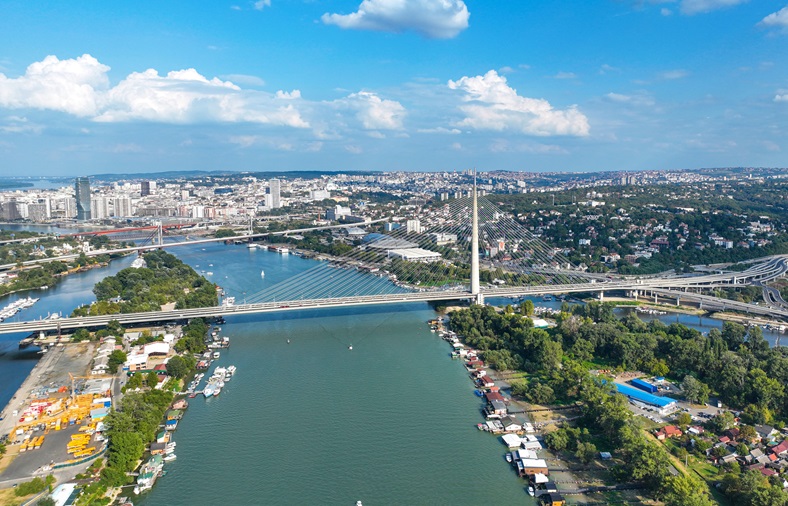Serbia, particularly its capital Belgrade, has emerged as a hotspot for foreign entrepreneurs. Thanks to its competitive tax system, low barriers to entry, and growing economy, Serbia offers non-residents many advantages when setting up a business. Whether you’re an individual or a company looking to expand, understanding Serbia’s business structure, taxation, and legal frameworks is crucial for making informed decisions.
Why choose Serbia?
Serbia is an attractive destination for foreign investors due to its 15% corporate tax rate, one of the lowest in Europe, and its strategic location within Southeast Europe. Non-residents are given equal rights as local entrepreneurs, with no significant legal obstacles to forming companies.
Legal forms of business entities in Serbia
There are several business structures that foreign non-residents can choose from when registering a company in Serbia. Each legal form comes with different requirements, particularly regarding share capital and liability.
1. Limited Liability Company (LLC) – Društvo sa Ograničenom Odgovornošću (DOO)
An LLC (DOO in Serbian) is the most common legal form chosen by foreigners. It’s flexible, allows for one or more shareholders, and has minimal share capital requirements.
- Share Capital: The minimum share capital required is RSD 100 (approximately €1), which makes this option highly accessible
- Liability: Shareholders are only liable for the company’s obligations up to the amount of their contributions, offering protection to personal assets.
- Management: The company must appoint at least one director, who can be either a foreign or domestic person.
2. Joint-Stock Company (JSC) – Akcionarsko Društvo (AD)
For larger-scale businesses or those looking to eventually go public, a Joint-Stock Company (AD) is a suitable structure.
- Share Capital: The minimum share capital required is RSD 3 million (approximately €25,000). This makes it a more significant financial commitment compared to an LLC.
- Liability: Shareholders’ liability is limited to their investment in the company’s shares.
- Management: A JSC requires a board of directors and offers more complex governance structures compared to an LLC.
3. Entrepreneur – Preduzetnik (PR)
This is an ideal structure for individuals who want a simpler legal form with fewer administrative requirements.
- Share Capital: There is no requirement for share capital when registering as an entrepreneur.
- Liability: Unlike LLCs, entrepreneurs are personally liable for the company’s debts and obligations, which means personal assets could be at risk.
- Taxation: Entrepreneurs may opt for a flat-rate tax system if their revenues are below a certain threshold.
4. General Partnership – Ortačko Društvo (OD)
A General Partnership is an option if two or more individuals wish to co-own a business.
- Share Capital: There is no mandatory share capital, but partners jointly contribute to the company’s capital.
- Liability: Partners share unlimited liability for the company’s debts, and each partner can be held fully liable for the partnership’s obligations.
5. Limited Partnership – Komanditno Društvo (KD)
In a Limited Partnership, one or more partners have unlimited liability, while others have liability limited to the amount of capital they have invested.
- Share Capital: There is no mandatory minimum share capital.
- Liability: The general partner(s) have unlimited liability, while the limited partner(s) have limited liability, making it a flexible structure for risk-sharing.
Steps to Register a Company in Serbia
1. Choose a Business Name and Legal Structure
Select a unique business name and decide which legal form best suits your business goals. The name must be approved by the Serbian Business Registers Agency (SBRA).
2. Business Registration
All company registrations must be completed online through the SBRA’s eRegistration platform.
3. Initial Capital Deposit
For LLCs and JSCs, you must deposit the initial share capital into a Serbian bank account. This step is not required for entrepreneurs or general partnerships.
4. Appoint Directors and Submit Documentation
Appoint at least one director and prepare the necessary founding documents, such as the Memorandum of Association and Articles of Association. These documents must be certified by an authorized Serbian lawyer.
5. Open a Bank Account
After registration with the SBRA, open a bank account for business operations. You will need to provide proof of your company’s registration and identification documents.
6. Obtain a Tax ID and Register for VAT
All Serbian companies must obtain a tax identification number (PIB) from the Serbian Tax Administration. If your company’s annual turnover exceeds RSD 8 million (approximately €68,000), you are required to register for Value Added Tax (VAT)
Tax regime in Serbia
Serbia’s tax environment is one of the most favorable in Europe, with a flat 15% corporate tax rate, making it an attractive destination for foreign investors.
1. Corporate Income Tax
- Rate: 15%
- This applies to all resident companies on their worldwide income and non-resident companies on their income sourced from Serbia.
2. Value Added Tax (VAT)
- Rate: The standard VAT rate is 20%, with a reduced rate of 10% applicable to certain goods and services.
- Companies with annual turnover exceeding RSD 8 million must register for VAT.
3. Withholding Tax on Dividends
- Rate: 20% withholding tax applies to dividend payments made to non-residents, but this may be reduced under Serbia’s double taxation agreements.
Dividend and capital gains taxation
1. Dividends
- Taxation on Dividends: A flat 20% withholding tax is imposed on dividends paid to foreign shareholders. However, Serbia has tax treaties with over 50 countries, potentially reducing this rate
- Double Tax Treaties: Many treaties reduce the rate to 5-10%, depending on the country of residence of the foreign shareholder
Gains
- Rate: The tax rate on capital gains for both residents and non-residents is 15%.
- Capital gains are calculated as the difference between the selling price and the acquisition cost of assets
Advantages of doing business in Serbia
1. Favorable Tax Environment
With a 15% corporate tax rate and the potential to reduce withholding taxes through double tax treaties, Serbia offers one of the most competitive tax regimes in Europe.
2. Financial Incentives
Serbia provides various government incentives, including non-refundable funds for startups, particularly in innovative sectors like IT. Tax incentives also apply to the employment of foreigners.
3. Strategic Location
Serbia’s location in Southeast Europe provides easy access to EU markets while maintaining favorable trade agreements with non-EU countries. This makes it a strategic hub for international operations.
Starting a business in Belgrade, Serbia as a non-resident is a compelling opportunity for foreign entrepreneurs. With favorable tax policies, minimal bureaucracy, and a low cost of entry, Serbia stands out as a business-friendly destination. By selecting the appropriate legal structure, understanding the tax implications, and navigating the administrative procedures, you can establish a thriving enterprise in this dynamic region.
Damalion helps international entrepreneurs to register their company in Serbia with business bank accounts. Contact your Damalion expert now.
This information is not intended to be a substitute for specific individualized tax or legal advice. We suggest that you discuss your specific situation with a qualified tax or legal advisor.
![]()
Belgrade, Serbia — how to open a company as a foreigner (non-resident): legal forms, minimum capital, taxes, registration steps, bank account, and timelines.
For entrepreneurs, investors, holding companies, SPVs and international groups • We help you prepare a clear file so banks, registries and authorities can review efficiently. Decisions remain at each institution’s discretion.
Last updated:
Why Serbia?
Stable rules, equal treatment for foreign founders, and competitive taxes. Corporate income tax is 15%. VAT is 20% (10% reduced for certain goods/services). Many double tax treaties may lower cross-border withholding on dividends, interest, or royalties. Location in Southeast Europe provides access to EU and regional markets.
Common legal forms
| Form | Share capital | Liability | Notes |
|---|---|---|---|
| Limited Liability Company (DOO) | RSD 100 minimum | Limited to contributions | One or more shareholders; at least one director (local or foreign). |
| Joint-Stock Company (AD) | RSD 3,000,000 minimum | Limited to shares | Board governance; suitable for larger ventures and listings. |
| Entrepreneur (sole trader) | No legal minimum | Unlimited, personal | Simple setup; flat-rate taxation may apply under thresholds. |
| General Partnership (OD) | No legal minimum | Unlimited (partners) | Partners are jointly and severally liable. |
| Limited Partnership (KD) | No legal minimum | GP unlimited; LP limited | Risk split between general and limited partners. |
| Branch / Representative Office | — | Parent company liable | For market entry without a separate legal entity. |
Documents you will need
- Valid passport/ID for founders and directors.
- Proof of address (recent utility bill or bank statement).
- UBO chart and ownership details; entries for the Beneficial Owners Register after incorporation.
- Founding act (Articles / Memorandum) and director appointment resolutions.
- Specimen signatures and IDs for authorized signers.
- For corporate shareholders: certificate of incorporation and good standing, with certified translation/apostille if requested.
- Tax information for founders (TIN where applicable); expected business activity and transactions.
How registration works
- Name and form. Pick a unique name and choose the legal form that fits your plan.
- Online filing. File at the Serbian Business Registers Agency (SBRA) through e-Registration with required data and documents.
- Capital deposit (when required). Deposit initial capital for DOO/AD to a Serbian bank account for issuance of proof.
- Director(s) and address. Appoint director(s) and set a registered seat.
- Tax numbers. Obtain PIB (tax ID). Register for VAT when annual turnover exceeds RSD 8,000,000 or voluntarily if it suits your model.
- Operational setup. Open the business bank account, set user rights, invoicing and controls.
Taxes at a glance
- Corporate income tax: 15%.
- VAT: 20% standard; 10% reduced on certain supplies.
- Withholding on dividends: 20% domestic rate; treaty rates may be lower.
- Capital gains: 15%.
- Payroll and social: employer and employee contributions apply under Serbian law.
Costs and timing
- Government fees for registration and publications.
- Notary/legalization and certified translations if requested.
- Bank account fees and payment services.
- Typical timeline: from complete file to activation is usually a few days to a few weeks, depending on activity, documents and bank checks.
Related reading
Frequently asked questions
Can a foreigner own 100% of a Serbian DOO?
Is there a local director requirement?
What is the minimum capital for a DOO?
What is the minimum capital for an AD (joint-stock company)?
How do I register the company?
Do I need a registered office?
When must I register for VAT?
What are the main tax rates?
Is there a Beneficial Owners Register?
Can I open the bank account remotely?
What financial statements are required?
Are e-invoices used?
How are dividends taxed to foreign shareholders?
Can my foreign company open a branch?
Do I need work or residence permits to act as a director in Serbia?
Can a company have a foreign bank account?
Are sector licenses required?
Can I use a shareholder loan?
How long does incorporation take?
Where do I get official information?
Note: This is general information as of 2025. It is not legal or tax advice. Please obtain advice tailored to your situation.
10 Best Things to Do in Belgrade, Serbia in 24 Hours
Discover Belgrade’s mix of history, culture, and modern life. Most landmarks are walkable within the central area or a short drive away. Jump to map
- Belgrade Fortress & Kalemegdan Park — scenic overlook of the Danube and Sava rivers.
- Knez Mihailova Street — main pedestrian promenade with shops and cafés.
- Skadarlija — bohemian cobblestone quarter with live music and Serbian cuisine.
- Temple of Saint Sava — one of the world’s largest Orthodox churches.
- Nikola Tesla Museum — dedicated to the inventor’s life and work.
- Republic Square — central hub with the National Museum and Theatre.
- Ada Ciganlija — river island turned leisure zone with beaches and cycling paths.
- Museum of Yugoslavia & House of Flowers — memorial complex dedicated to Yugoslav history.
- Zemun & Gardoš Tower — charming district with panoramic views.
- Sava Promenade (Belgrade Waterfront) — riverside walk lined with restaurants and parks. Back to top
10 Best Hotels in Belgrade, Serbia
Stay close to major attractions and business districts. Belgrade offers a blend of heritage hotels and modern design stays for all budgets.
- Square Nine Hotel Belgrade — five-star luxury in the historic center.
- Metropol Palace Belgrade — elegant landmark near Tašmajdan Park.
- Hilton Belgrade — rooftop bar, modern rooms, and spa.
- Hyatt Regency Belgrade — ideal for business travelers in New Belgrade.
- Radisson Collection Old Mill Belgrade — industrial-chic hotel with local art.
- SAINT TEN Hotel — boutique experience in Vračar district.
- Hotel Moskva — iconic art-nouveau property on Terazije Square.
- Courtyard by Marriott Belgrade City Center — central comfort next to Republic Square.
- Mama Shelter Belgrade — trendy rooftop views and casual charm.
- Falkensteiner Hotel Belgrade — sleek stay in the business zone of New Belgrade. Back to top

















